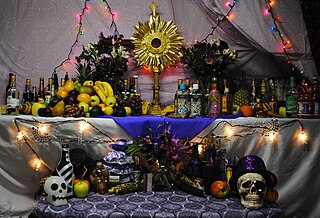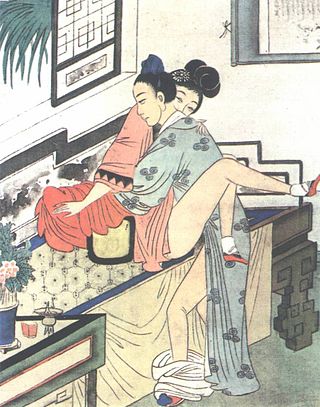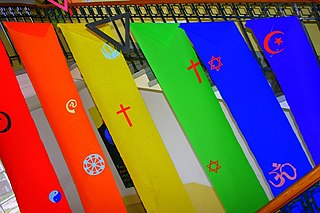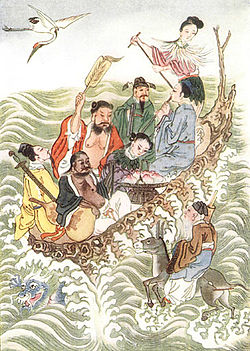The relationship between religion and homosexuality has varied greatly across time and place, within and between different religions and denominations, with regard to different forms of homosexuality and bisexuality. The present-day doctrines of the world's major religions and their denominations differ in their attitudes toward these sexual orientations. Adherence to anti-gay religious beliefs and communities is correlated with the prevalence of emotional distress and suicidality in sexual minority individuals, and is a primary motivation for seeking conversion therapy.
Homosexuality has been documented in China since ancient times. According to one study by Bret Hinsch, for some time after the fall of the Han dynasty, homosexuality was widely accepted in China but this has been disputed. Several early Chinese emperors are speculated to have had homosexual relationships accompanied by heterosexual ones. Opposition to homosexuality, according to the study by Hinsch, did not become firmly established in China until the 19th and 20th centuries through the Westernization efforts of the late Qing dynasty and early Republic of China. On the other hand, Gulik's study argued that the Mongol Yuan dynasty introduced a more ascetic attitude to sexuality in general.
Hindu views of homosexuality and LGBT issues more generally are diverse, and different Hindu groups have distinct views.

Homosexuality in Haitian Vodou is religiously acceptable and homosexuals are allowed to participate in all religious activities. However, in West African countries with major conservative Christian and Islamic views on LGBTQ people, the attitudes towards them may be less tolerant if not openly hostile and these influences are reflected in African diaspora religions following Atlantic slave trade which includes Haitian Vodou.

Taoist sexual practices are the ways Taoists may practice sexual activity. These practices are also known as "joining energy" or "the joining of the essences". Practitioners believe that by performing these sexual arts, one can stay in good health, and attain longevity or spiritual advancement.
Tu'er Shen or Tu Shen, is a Chinese deity who manages love and sex between men. His name literally means "rabbit deity". His adherents refer to him as Ta Yeh.

Lesbian, gay, bisexual, and transgender (LGBT) affirming religious groups, otherwise referred to as gay-affirming religious groups, are religious groups that welcome LGBT people as their members, do not consider homosexuality as a sin or negative, and affirm LGBT rights and relationships. They include entire religious denominations, as well as individual congregations and places of worship. Some groups are mainly composed of non-LGBT members and they also have specific programs to welcome LGBT people into them, while other groups are mainly composed of LGBT members.

Xian refers to a person or similar entity having a long life or being immortal. The concept of xian has different implications dependent upon the specific context: philosophical, religious, mythological, or other symbolic or cultural occurrence. The Chinese word xian is translatable into English as:

Lesbian, gay, bisexual and transgender (LGBT) people in the People's Republic of China (PRC) may face some legal and social challenges that are not experienced by non-LGBT residents. While both male and female same-sex sexual activity are legal, same-sex couples are currently unable to marry or adopt, and households headed by such couples are ineligible for the same legal protections available to heterosexual couples. No explicit anti-discrimination protections for LGBT people are present in its legal system, nor do hate crime laws cover sexual orientation or gender identity.
The relationship between transgender people and religion varies widely around the world. Religions range from condemning any gender variance to honoring transgender people as religious leaders. Views within a single religion can vary considerably, as can views between different faiths.

A same-sex relationship is a romantic or sexual relationship between people of the same sex. Same-sex marriage refers to the institutionalized recognition of such relationships in the form of a marriage; civil unions may exist in countries where same-sex marriage does not.

LGBT themes in mythology occur in mythologies and religious narratives that include stories of romantic affection or sexuality between figures of the same sex or that feature divine actions that result in changes in gender. These myths are considered by some modern queer scholars to be forms of lesbian, gay, bisexual, or transgender (LGBT) expression, and modern conceptions of sexuality and gender have been retroactively applied to them. Many mythologies ascribe homosexuality and gender fluidity in humans to the action of gods or of other supernatural interventions.

In Ancient Greek religion and mythology, the Erotes are a collective of winged gods associated with love and sexual intercourse. They are part of Aphrodite's retinue. Erotes is the plural of Eros, who as a singular deity has a more complex mythology.
Greco-Roman mythology features male homosexuality in many of the constituent myths. In addition, there are instances of cross-dressing, and of androgyny which has been grouped under the acronym LGBTQ+.
Various LGBT themes are present in different in African diasporic mythologies, primary among them being Voodoo.
Christian denominations have a variety of beliefs about sexual orientation, including beliefs about same-sex sexual practices and asexuality. Denominations differ in the way they treat lesbian, bisexual, and gay people; variously, such people may be barred from membership, accepted as laity, or ordained as clergy, depending on the denomination. As asexuality is relatively new to public discourse, few Christian denominations discuss it. Asexuality may be considered the lack of a sexual orientation, or one of the four variations thereof, alongside heterosexuality, homosexuality, bisexuality, and pansexuality.

The relationship between religion and lesbian, gay, bisexual, and transgender (LGBT) people can vary greatly across time and place, within and between different religions and sects, and regarding different forms of homosexuality, bisexuality, non-binary, and transgender identities. More generally, the relationship between religion and sexuality ranges widely among and within them, from giving sex and sexuality a rather negative connotation to believing that sex is the highest expression of the divine.

In Hindu Epic, there are deities or heroes whose attributes or behavior can be interpreted as lesbian, gay, bisexual, or transgender (LGBT) or have elements of gender variance and non-heterosexual sexuality. Traditional Hindu literary sources do not speak of homosexuality directly, but changes of sex, homoerotic encounters, and intersex or third gender characters are often found both in traditional religious narratives such as the Vedas, Mahabharata, Ramayana and Puranas as well as in regional folklore.

The following outline offers an overview and guide to LGBT topics.
Lord Longyang was the favorite and lover of an unknown king of Wei, often speculated to be either King Anxi or King Jia, during the Warring States period of the Zhou dynasty. Little is known about him outside of his relationship with the king.











